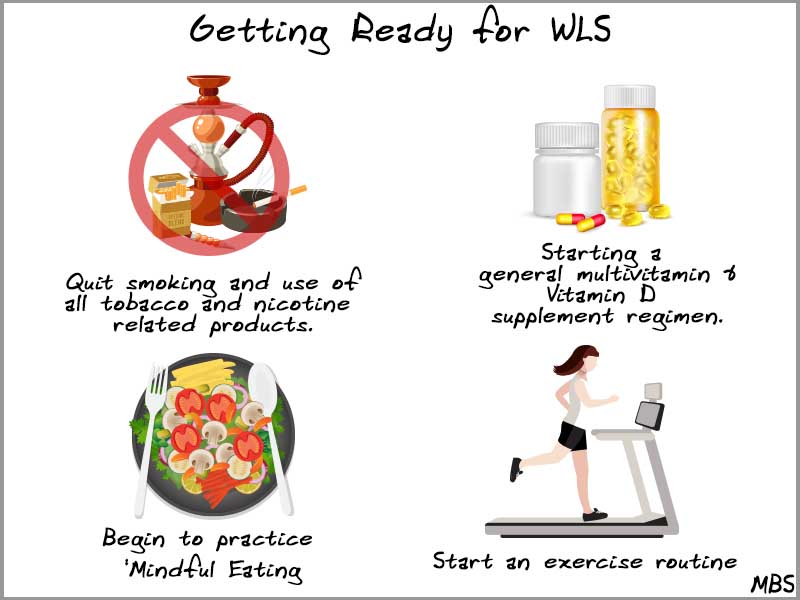90 Days Before Bariatric Surgery: Pre-op Instructions
Medically Reviewed by Katelyn J. Mock, US-Registered Dietician (R.D.)
Congratulations! You have started on the journey to a healthier you. There is immense value in taking time before surgery to prepare your body and your mind for the various changes you are going to experience.
The road to a healthy lifestyle is always evolving, but following these tips before surgery will help to make the journey easier.
At this point, there appears to be plenty of time to get things in order for your big day.
However, time passes quickly and there is no time like the present to begin making some positive changes that will have lifelong results.
Preparing for Life Stressors

Life stressors will continue to happen and whatever issues lead initially to weight gain will likely return in some manner.
Video: Pre-made Tomato Soup
It is important to spend time thinking about what has made losing weight difficult for you in the past. Focus on making some small lifestyle changes in each of those areas and plan how you can better support yourself.
You are human, and will make mistakes, try not to judge or get down on yourself. Instead, think about what you can learn from the experience and what positive steps you can take moving forward.
- Maybe you have difficulty finding the time to cook. Work on pre-planning meals for the week.
- Maybe you have a food addiction and/or struggle with emotional/stress eating. Look into seeing a counselor and/or read some books about overcoming emotional eating.
- Maybe you do not take the time to exercise. How can you restructure your day or where are you willing to cut back, so you have more time to dedicate towards your health goals.
- Did you get frustrated with plateaus in the past and give up previous diets when you hit a stall? Plateaus, while very frustrating, are a normal part of any weight loss process, even surgery.
Quit Smoking
The use of nicotine and tobacco has been shown to increase the risk of complications during the actual weight loss surgery itself and afterward due to the decreased blood supply to your body’s tissues.
This can delay the healing process after surgery. The use of tobacco has been associated with blood clots, the largest cause of death after bariatric surgery according to the ASMBS (American Society for Metabolic and Bariatric Surgery).
- The ASMBS recommends quitting smoking and tobacco/nicotine related products at least six weeks before surgery to decrease the risk of fatal blood clots and pneumonia.
- Quitting tobacco and nicotine is one of the greatest challenges for many individuals, but has just as many positive health rewards in the long term as losing weight.
- Do not wait until 6 weeks before surgery to stop, start ASAP to give you the best chance at a healthier life.
Start a General Multivitamin & Vitamin D Supplement Regimen
- Consider having your primary physician do some routine lab work to check for any potential pre-existing nutrient deficiencies.
- At this point, you do not need to take a bariatric specific vitamin, but it can be a good idea to start a general multivitamin in case you are low or deficient in any micronutrient.
- Individuals with obesity have a much higher risk of Vitamin D deficiency. The cause of which is not 100% understood, but likely has to do with this “sunshine” vitamin being sequestered in adipose tissue. Talk with your physician about an appropriate dose.
Start an Exercise Routine
The more physically active you are before surgery, the faster your recovery from surgery tends to be. Exercise and building muscle before surgery can also decrease your risk of complications associated with surgery. Below are some examples of low to moderate intensity exercises to try:
- Walking on a treadmill, using the stationary bike or elliptical machine.
- Use resistance bands and light hand weights.
- Try water aerobics or swimming.
- Look up chair exercises videos online or check out an exercise video from your local library.
Begin to Practice Mindful Eating
By becoming more aware of what triggers you to eat and spending time thinking about “Why” you and eat and “How” you eat, you learn insights into your eating behaviors that can help with making long term positive changes around food. It is important to try your best to avoid being judgmental of yourself during this process and simply observe the choices you make.
Video: Stop Evening Snacking after WLS
- Start by slowing down at meals. Take no more than 2 bites of food each minute. Put your utensils down between bites. Chew food thoroughly and wait at least 5-10 seconds after swallowing before picking up your fork and taking another bite.
- Avoid distracted eating by only eating at your kitchen table or counter. Do not eat in front of the television or any other type of screen including a computer or phone. Distracted eating typically occurs with simple, high-calorie carbohydrates and rarely results in an individual feeling satisfied.
Video: Why to Avoid Distracted Eating
Find a primary physician in your area that is supportive of your decision to have weight loss surgery and will follow you medically after your procedure.
Make Healthy Additions to Your Diet
- Begin including at least 3 servings of non-starchy vegetables and 2 servings of fresh fruit daily in your meals and snacks. A serving is 1 cup raw or 1/2 cup cooked.




